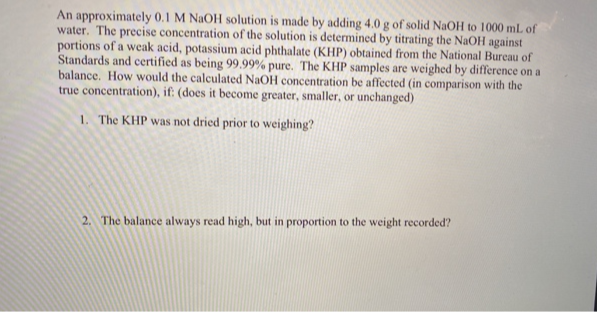An approximately 0.1 M NaOH solution is made by adding 4.0 g of solid NaOH to 1000 mL. of water. The precise concentration of the solution is determined by titrating the NaOH against portions of a weak acid, potassium acid phthalate (KHP) obtained from the National Bureau of Standards and certified as being 99.99% pure. The KHP samples are weighed by difference on a balance. How would the calculated NaOH concentration be affected (in comparison with the true concentration), if: (does it become greater, smaller, or unchanged) 1. The KHP was not dried prior to weighing? 2. The balance always read high, but in proportion to the weight recorded?
An approximately 0.1 M NaOH solution is made by adding 4.0 g of solid NaOH to 1000 mL. of water. The precise concentration of the solution is determined by titrating the NaOH against portions of a weak acid, potassium acid phthalate (KHP) obtained from the National Bureau of Standards and certified as being 99.99% pure. The KHP samples are weighed by difference on a balance. How would the calculated NaOH concentration be affected (in comparison with the true concentration), if: (does it become greater, smaller, or unchanged) 1. The KHP was not dried prior to weighing? 2. The balance always read high, but in proportion to the weight recorded?
Chemistry
10th Edition
ISBN:9781305957404
Author:Steven S. Zumdahl, Susan A. Zumdahl, Donald J. DeCoste
Publisher:Steven S. Zumdahl, Susan A. Zumdahl, Donald J. DeCoste
Chapter4: Types Of Chemical Reactions And Solution Stoichiometry
Section: Chapter Questions
Problem 152CP
Related questions
Question

Transcribed Image Text:An approximately 0.1 M NaOH solution is made by adding 4.0 g of solid NaOH to 1000 mL of
water. The precise concentration of the solution is determined by titrating the NaOH against
portions of a weak acid, potassium acid phthalate (KHP) obtained from the National Bureau of
Standards and certified as being 99.99% pure. The KHP samples are weighed by difference on a
balance. How would the calculated NaOH concentration be affected (in comparison with the
true concentration), if: (does it become greater, smaller, or unchanged)
1. The KHP was not dried prior to weighing?
2. The balance always read high, but in proportion to the weight recorded?
Expert Solution
This question has been solved!
Explore an expertly crafted, step-by-step solution for a thorough understanding of key concepts.
This is a popular solution!
Trending now
This is a popular solution!
Step by step
Solved in 2 steps

Knowledge Booster
Learn more about
Need a deep-dive on the concept behind this application? Look no further. Learn more about this topic, chemistry and related others by exploring similar questions and additional content below.Recommended textbooks for you

Chemistry
Chemistry
ISBN:
9781305957404
Author:
Steven S. Zumdahl, Susan A. Zumdahl, Donald J. DeCoste
Publisher:
Cengage Learning


Chemistry: An Atoms First Approach
Chemistry
ISBN:
9781305079243
Author:
Steven S. Zumdahl, Susan A. Zumdahl
Publisher:
Cengage Learning

Chemistry
Chemistry
ISBN:
9781305957404
Author:
Steven S. Zumdahl, Susan A. Zumdahl, Donald J. DeCoste
Publisher:
Cengage Learning


Chemistry: An Atoms First Approach
Chemistry
ISBN:
9781305079243
Author:
Steven S. Zumdahl, Susan A. Zumdahl
Publisher:
Cengage Learning

Introductory Chemistry: A Foundation
Chemistry
ISBN:
9781337399425
Author:
Steven S. Zumdahl, Donald J. DeCoste
Publisher:
Cengage Learning

Chemistry: Principles and Practice
Chemistry
ISBN:
9780534420123
Author:
Daniel L. Reger, Scott R. Goode, David W. Ball, Edward Mercer
Publisher:
Cengage Learning

Chemistry: Principles and Reactions
Chemistry
ISBN:
9781305079373
Author:
William L. Masterton, Cecile N. Hurley
Publisher:
Cengage Learning